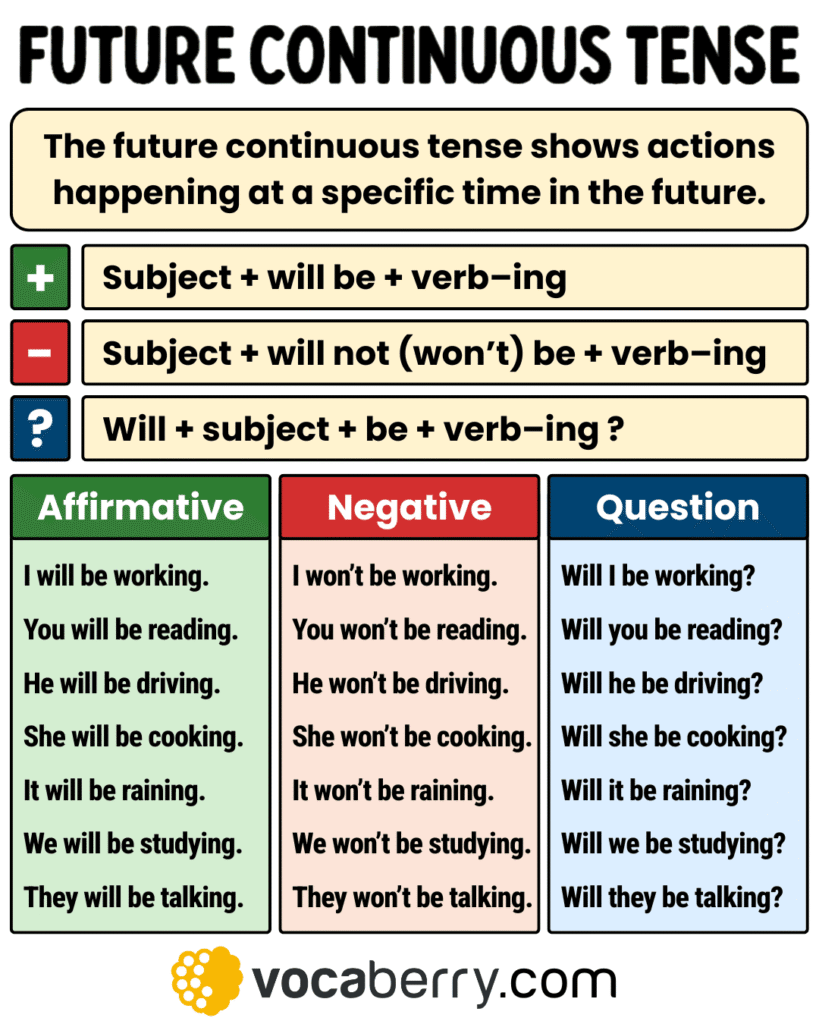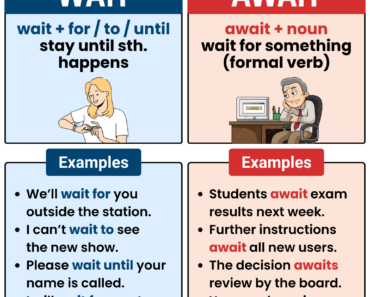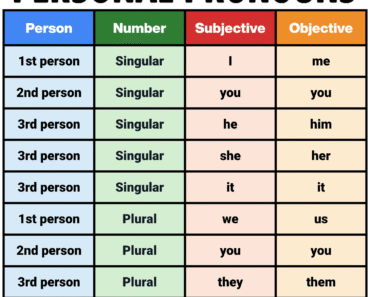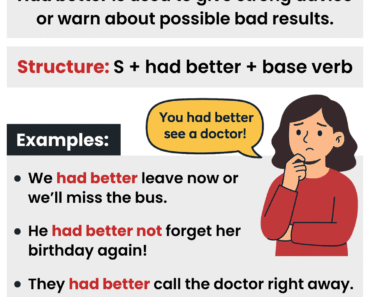
The future continuous tense is used to describe actions or events that will be in progress at a specific time in the future. It shows that something will continue for a period rather than happen instantly. This tense often describes future plans, arrangements, or predictions about what will be happening. The structure combines will + be + the present participle (verb + -ing) to make it clear the action will last over a duration.
In this lesson, you’ll learn how to form and use the future continuous tense in affirmative, negative, and question forms, understand its structure, grammar rules, and usage, explore common time expressions, and see clear examples.
When to Use the Future Continuous Tense
The future continuous tense is used in English to show that an action will be happening at a particular time in the future. It emphasizes that the action will be in progress during that moment or over a period of time. Here are the most common ways this tense is used:
1. Actions in Progress at a Specific Time in the Future
Use it to describe an activity that will be happening at a particular moment.
Examples:
- This time tomorrow, I will be flying to New York.
- At 8 p.m., she will be studying for her exam.
- When you arrive, they will be having dinner.
2. Planned or Arranged Future Events
Use it to talk about future arrangements that are already decided or scheduled.
Examples:
- We will be meeting with the client on Friday.
- He will be staying at the Hilton during the conference.
- I will be attending the workshop next month.
3. Parallel Actions in the Future
Use it to describe two actions that will be happening at the same time.
Examples:
- While I’m working, my brother will be traveling in Europe.
- She will be cooking dinner while he is cleaning the house.
- They will be watching TV and eating popcorn.
4. Polite or Indirect Questions About Someone’s Plans
Use it to ask politely about someone’s intentions without sounding forceful.
Examples:
- Will you be using the car this evening?
- Will she be joining us for lunch?
- Will they be coming to the meeting tomorrow?
Future Continuous Tense Structure
The future continuous tense is formed by combining the auxiliary verb will, be, and the present participle (verb + -ing). This structure stays the same for all subjects (I, you, he, she, it, we, they) and is used to show that an action will be in progress at a specific time in the future. You can use it in affirmative, negative, and question sentences, plus short answers.
Below, you’ll learn how to form each type with clear examples.
Affirmative Form
Use this form to say that an action will be happening at a certain time in the future.
Structure: Subject + will + be + verb-ing
Examples:
- She will be working late tonight.
- I will be studying all weekend.
- They will be traveling to Italy next month.
Negative Form
Use this to show that an action will not be happening.
Structure: Subject + will not (won’t) + be + verb-ing
Examples:
- He will not be attending the meeting.
- We won’t be staying at the hotel.
- I won’t be using the computer tonight.
Question Form
Use this form to ask whether an action will be in progress at a specific time.
Structure: Will + subject + be + verb-ing?
Examples:
- Will you be coming to the party?
- Will she be working tomorrow?
- Will they be joining us later?
Short Answers
Use short responses for yes/no questions.
Examples:
- Will you be working? – Yes, I will. / No, I won’t.
- Will she be coming? – Yes, she will. / No, she won’t.
- Will they be traveling? – Yes, they will. / No, they won’t.
Summary Table: Future Continuous Tense
| Type | Structure | Example |
|---|---|---|
| Affirmative | S + will + be + verb-ing | She will be studying tonight. |
| Negative | S + will not / won’t + be + verb-ing | He won’t be working tomorrow. |
| Question | Will + S + be + verb-ing? | Will you be coming to the event? |
| Short Answer | Yes/No + S + will/won’t | Yes, I will. / No, I won’t. |
Time Expressions with the Future Continuous Tense
The future continuous tense is often used with time expressions that specify exactly when an action will be happening. These phrases help clarify both the timing and the duration of an activity in the future. Time expressions can refer to a specific point (e.g., at 5 p.m.), a period (e.g., all day), or another action (e.g., when you arrive).
Here are the most common time expressions and examples of how they’re used:
| Time Expression | Example Sentence |
|---|---|
| at this time tomorrow | I will be traveling at this time tomorrow. |
| at 8 o’clock | She will be working at 8 o’clock tonight. |
| when | He will be sleeping when you arrive. |
| while | They will be studying while we are at the gym. |
| all day | We will be cleaning the house all day. |
| during | She will be presenting during the conference. |
| later today | I will be working on the report later today. |
| next month | They will be traveling abroad next month. |
| in a few hours | I will be driving to the airport in a few hours. |
| over the weekend | We will be painting the house over the weekend. |
| by this time next week | I will be relaxing on the beach by this time next week. |






